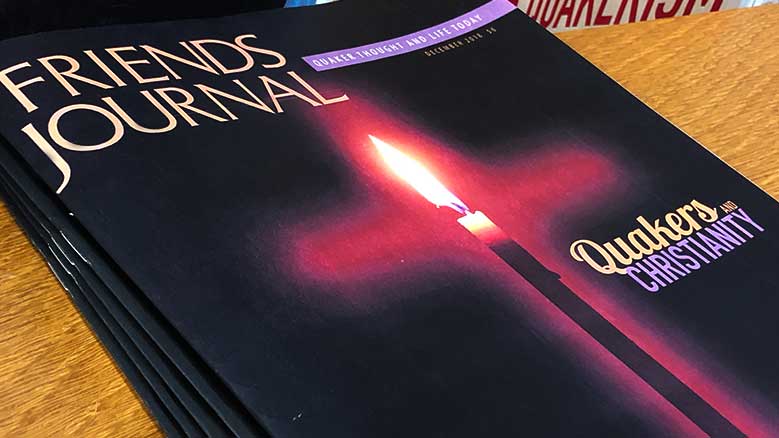As modern Quakers, we take great pride in our distinctive traditions, procedures, and culture. This is one of the main ways that we affirm our sense of identity as Friends. We know that we are Quakers because we worship on the basis of silence . . . right? Or maybe it’s because we do not have paid ministers. Then again, perhaps we are true Quakers because we adhere to Friends business practices.
What if our insistence on Quaker norms is getting in the way of the living Spirit who inspired our faith in the first place? In a recent article for Quaker Life, David Johns warns that, “All along the spectrum of Quakerism . . . there is a dangerous conservative impulse at work which is crushing the movement.” This applies to all Quakers, as “even the most liberal Friends are conservative in this sense.” Regardless of our theological persuasion, Friends have a tendency to prefer the safety of tradition over the risky business of following new leadings from God.
Far too often, our efforts to preserve the distinctive traits of our 350-year-old tradition have become more important than listening and obeying the living voice of the Spirit in our midst. We can get so bogged down evaluating whether we are sufficiently Quaker that we fail to ground our lives in the continuing revelation of Jesus and his good news. In our zeal for Quaker traditions, we risk losing sight of the very Spirit that these practices are meant to point us towards.
Let me give an example. A couple of years ago, I visited a small, unaffiliated worship group. As it so happened, the group was also visited that day by someone from a nearby yearly meeting. After worship, we all had dinner together, and the conversation turned to how or whether the worship group should seek formal affiliation with a wider community. The visitor from the nearby yearly meeting insisted they should join him, suggesting that the members of this fledgling group would only be real Quakers once they were members of a yearly meeting.
I personally feel that connection with the wider community of Friends is extremely important, and I would have been very much on board if this individual had spoken of the benefits that his yearly meeting could offer the new worship group. I am sure that there were many. But instead, the main argument for affiliation with his organization seemed to be that it would allow these worshipers to become “real Quakers.”
Far too often, we demonstrate more concern with making sure that everyone follows the right forms and procedures than with doing the work of following Jesus and receiving his Light in our hearts. At worst, we may actually come to believe that the primary purpose of being Friends is to perpetuate the institution of Quakerism, rather than speak to the deep needs of our friends, neighbors, and surrounding communities.
It does not have to be this way. What if, instead of our endless fixation about Quaker procedures and peculiarities, we focused on the experience and practice of God’s ongoing work in our midst? What if, instead of posing the question, “Are we real Quakers?” we asked instead, “Are we being faithful to the direction of the risen Lord among us, right now?”
The point of our life together as Friends of Jesus is to embody the living presence of his Spirit. Our traditions and procedures certainly have a part to play in this mission. The rich heritage of our spiritual ancestors can serve as a helpful instruction in our walk of faith. The witness of those who have gone before us is instructive as we seek to live faithful lives. But tradition is not the message. As David Johns so eloquently puts it, “Quaker-ism, as a thing we possess or a thing we are, must die if the faith of Quakers is to live.”
Are we ready to die to Quakerism so that the gospel Friends have experienced may find fullest expression? Are we ready to surrender our need to be “real Quakers” so that we can become children of the Light? Are we prepared to lay everything on the table so that we may be faithful to the continuing revelation of Jesus? Are we ready to move forward together in faith?





Good piece, thank you. Please read my book The early Quakers and the ‘kingdom of God’. It’s right up your alley!
Gerry
Thank you for sharing this. You hit the nail on the head. Being a Friend or Quaker is only a demonstration of how we worship the Risen Savior. It is not the end of our faith.
Sure would be nice if a Quaker denomination affiliation was a guarantee of solid Quaker teaching. I was excited to move to a town in rural western Kansas that had an EFCI affiliated church. I had no experience with EFCI, but from what I had read prior to coming, I thought the Quaker teaching was something I could really get on board with. However I have discovered that they have left all the Quaker distinctives behind and are now indistinguishable from any other Evangelical Protestant church. Very disappointing.
Intention is a word that springs to mind as I read your words. If intent becomes too bound in the form it is a hollow shell. And yet the form can be useful at difficult times, a pattern, a proceedure in which to sit. But then it has to go, our individual relationship to the divine has to be seen, that is what is real – in all its glories and difficulties
Great article. I’ve always found that the prioritising of form & rules over listening to spirit to be exactly like the old religions; catholic & episcopalian etc. For me, being Quaker is about not letting form & function get in the way of the still small voice.
I think it’s easier to adhere to rules so I get why some are drawn to this way of being Quaker. I know that’s not for me.
In my experience as a member of a very young monthly meeting in a western liberal unprogrammed independent yearly meeting, most people participate in our meetings because they aspire to do things (worship, build community, make decisions, celebrate life’s passages, work for peace-justice-environmental-sustainability, etc.) the way Quakers (apparently) do. Membership in the Religious Society of Friends (that is, formally being a “Quaker”) means, for the most part, being recognized for doing things the way other people in the same monthly meeting do things.
Some of us experience leadings, some of which some of us believe might come from something some of us might call “God,” others have no faith in any thing by that name. I agree with Micah, which is to say that I would suggest that there would be little (spiritual or secular) unity around the idea of corporate faithfulness to a revelation of any “God,” unless that means doing things the way Quakers (apparently) do.
Hi Micah! My husband and I used to worship with you and Faith for a bit several years ago. I’ve recently returned to seeking out the Quaker way after a spiritual dry spell. I loved what you wrote here, as I feel like I need a label to identify my religious convictions, yet I am spiritually in between religions, if you will. I feel like a Quaker at heart, and I’m only beginning to embark on the journey of discerning official conversion/convincement, so I was researching what to call myself in the interim. Imagine my surprise when I realized I had actually met you in real life! t
The idea that Quaker distinctives get in the way of direct revelation from the Spirit is foreign to me. Those distinctives, our silent worship, our business practices, our lack of top-down structure are all designed specifically NOT to get in the way of our communication with the Spirit. Our basic belief as Quakers is that God still speaks to us, each of us. Everyone from the youngest child to the oldest adult is capable of hearing God speak and is equal before God. We do not need pastors to tell us what God said, or what the Bible means. We don’t need authorities to tell us what is right and good. We have the Spirit to guide each of us daily.
Community is a necessary part of our faith, but it does not dictate what we believe or what Scripture means to us. Each individual, guided by the Spirit, is capable of, and responsible for listening to God.
If we truly do not have the Spirit guiding us, if we allow or demand top-down leadership, if we allow traditional understandings to negate new teachings from the present Spirit, if we demand that members follow certain forms based on tradition, then we truly are in trouble.
There is nothing wrong with Quaker distinctives if they arise out of our desire for, and belief in the present Spirit and its authority in our daily lives. When those distinctives are allowed to banish the Spirit from our lives then we are lost.
At worst, you are saying “Let’s ignore the Highway Code and just concentrate on getting to our destination”. You would crash. And if the clerk said “Is that minute acceptable Friends?” and someone said “Yes” rather than “Hope so” the sky would not fall in, and yet I might avoid saying “yes” in case it discomfited Friends. And I don’t think “Hope so” is so offputting to new attenders that it is the individual strangeness that will drive them away.
Is the difference in that YM member merely semantic? You are part of the Body of Christ, but more a part of it if you associate with it more deeply. If you join the YM you become real Quakers. What do they gain? Communion. Affirmation: they are not just saying they are Quakers, a body of Quakers recognises they are Quakers. Yes let us follow the spirit, and any part of the form which blocks that should be shed; but don’t chuck things out for the sake of it.
The insight given by Micah Bales can be applied to all other form of Christian faith. Specifically, a true follower of Jesus, Christ our Lord, is one that tries to express and exhibit Christ’s love towards others. It is not the person that is faithful towards the tradition of his or her faith, but is faithful in striving to behave towards others as Christ would want his believers to do. I was not raised in the Quaker Society (I am a descendant of many Quakers); I have been exposed to many other faiths, such as Baptist, Lutheran, Catholic and Methodist . I have found through my experiences with the varies faith, that all have flaws. I have also found a few faithful true Christians from among the varies denominations. The common theme with these individuals is that thier sincere Christ like love shines so bright through their behavior towards others. They don’t pass judgment on others and at the same time hold themselves accountable to Christ. I love traditions, it provides security, however, I know that it does not define Christ. It is a challenge to sincerely love others without judgment, for we feel better about ourselves when we believe we are doing something better than someone else. I think the Quaker faith is the closest to the truth, without the tradition and judgment of others. Keep seeking the truth. Shine brightly for others to see the light. Regards.